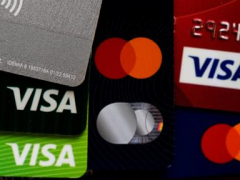NEW YORK — Credit card defaults are on the rise for Americans, reaching the highest level in 14 years. U.S. credit card defaults jumped to a record $46 billion from January through September 2024, according to the Financial Times, citing data analyzed by BankRegData.
With high levels of credit card debt and high inflation, many consumers have found themselves unable to cover monthly payments, leading some to default.
A borrower goes into default when they miss credit card payments for over 180 days, roughly six months. When there is a failure to pay over such a long period, banks generally take this as a sign that a borrower won’t pay the debt anymore, said Matt Sotir, financial advisor with Equitable Advisors based in New Hampshire.
Defaulting on credit card debt can have serious consequences, including a negative impact on credit reports that lead to a long-lasting effect on the ability to borrow money, said Sotir.
“These are debts that have a lot of impact and I think sometimes people don’t realize that if they missed (a payment), how bad it could be for them in other areas,” added Sotir.
Here’s what you should know about credit card defaults.
There are several levels of consequences when credit card payments are not made. It begins with late fees, higher interest rates and a potentially lower credit score. If a borrower doesn’t pay for 30 days the bank considers the credit card “delinquent” and the borrower’s credit scores can be damaged further.
When a borrower fails to make a payment for roughly six months, the bank considers the credit card in default, which means they will close your account and refer you to a collection agency, said Chip Lupo, writer at WalletHub.
“That’s where you’re going to really have trouble obtaining future credit for a while,” said Lupo.
When a collection agency assumes your debt, they will reach out via phone, email and mail to encourage you to pay up. Eventually, if not paid, the collection agency may take legal action against the borrower.
The first step is to be proactive, recommended Sotir. Whether it’s reaching out to your bank or working with a financial advisor, the quicker you start looking for viable solutions





